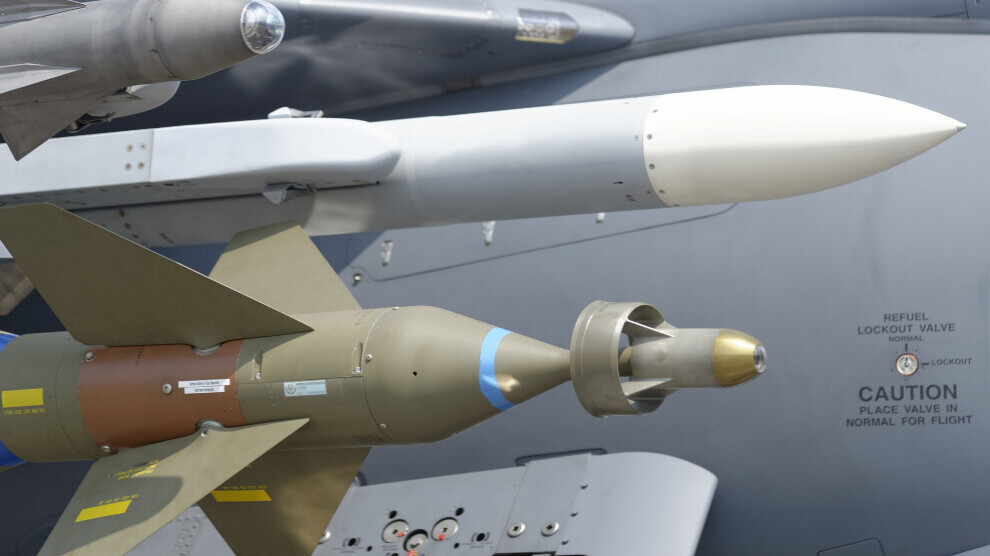A retired officer from the Turkish army and former pilot lieutenant general Erdoğan Karakuş talked about tactical nuclear weapons of the Turkish army in a TV show on March 23, 2022: “Tactical nuclear weapons are not considered atomic bombs. Our land forces had tactical nuclear weapons in their inventory previously. They are launched by artillery units. You can arrange the level of destruction. They cause low destruction. The nuclear weapons dropped in Japan were 20 kilotons, tactical nuclear weapons are half a kiloton.”
While the former Turkish soldier was trying to give detailed information on tactical nuclear weapons, the TV channel went off the air, yet his remarks are an important confession that Turkey possesses nuclear weapons. It has been revealed that the tactical weapons mentioned by the retired Turkish officer have also been used frequently during the Turkish invasion attack launched on the regions of Zap, Avaşîn and Metina in guerrilla-held Medya Defense Zones in South Kurdistan (North Iraq) on April 17, 2022.
Speaking to Medya Haber TV the day before, PKK (Kurdistan Workers’ Party) Executive Committee Member Duran Kalkan pointed out that the Turkish army may have used tactical nuclear weapons at Tepê Sor, one of the resistance areas of HPG and YJA Star guerrillas. Duran Kalkan cited the guerrillas who survived the clashes at Tepê Sor. So, what is a "tactical nuclear weapon" and what type does the Turkish army have?
'MINI ATOMIC BOMBS'
“Strategic nuclear weapons” generally refer to nuclear weapons that can be launched at a high or intercontinental range, while those designed for shorter ranges are called “tactical nuclear weapons”. These weapons have an effect diameter of 1 to 3 km and are produced for brigade-sized units in the NATO member armies. The yield of tactical nuclear weapons is generally similar to mini-atomic bombs. Although they are called tactical, they are often used for strategic purposes.
Nikolai Sokov, a member of the Centre for Non-proliferation Studies, explained the dangers of these weapons in research he conducted for the Nuclear Threat Initiative: “Tactical nuclear weapons are in some ways more dangerous than strategic weapons. They are small in size and vulnerable to stealing, which makes them a risk to global security.”
DESTROYING ALL LIFE IN THE TARGETED AREA
Tactical nuclear weapons, which include gravity bombs, short-range missiles, artillery shells and land mines, are abundant in the inventory of NATO member countries, particularly the U.S. Since the smallest "tactical nuclear weapon" has an explosive yield of tens of tons of TNT, it is estimated that the Turkish army used them to destroy tunnels, caves and crossing points in the bases of the Kurdistan freedom guerrilla.
These tactical nuclear weapons can destroy all living things in an area where they are used, and generally have an explosive yield of several kilotons. For instance, the bombs dropped by the U.S. on Hiroshima and Nagasaki caused 15 and 20 kiloton explosions. Experts point out that even if used in very small amounts, they can cause a radiation effect in a wide geography, leading to radioactive fallout through rain.
TURKEY SEEKING NUCLEAR WEAPONS SINCE 2015
Turkey has increased its attempts to obtain nuclear weapons in recent years. Turkey signed a nuclear reactor agreement with the Russian company ROSATAM for 20 billion dollars in 2011. The country also took part in another project launched in a Japanese-French partnership worth 22 billion dollars in 2013. While the Erdogan regime claims that these agreements were made to meet the country’s energy requirements, the German intelligence service BND reported in 2015 that “Turkey has opened its door to a military nuclear option through these two projects”.
According to the same report, Turkey established facilities to enrich uranium and started to produce uranium concentrate powder called “Yellowcake”. Turkey has illegally procured uranium through Kosovo and Bosnia and Herzegovina. Turkey's most important nuclear supplier is Pakistan, which sells missiles with nuclear warheads on the black market.
According to reports and comments in the Arab and Indian media outlets, Erdogan maintains good relations with Pakistan about procuring nuclear warheads. The news site “zeenews.india.com” reported that in December 2020, Pakistani and Turkish military delegations held talks about nuclear sales for two days. It further reported that the F-16 fighter jets of the Turkish army, which were modernized between 2015 and 2018 with the support of NATO, have been modified to carry nuclear missiles.














